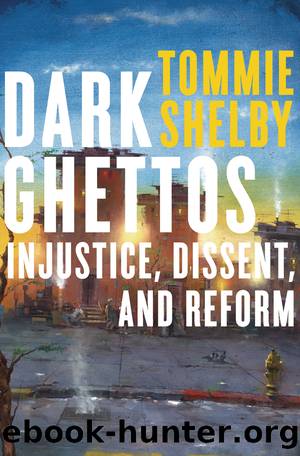Dark Ghettos by Tommie Shelby

Author:Tommie Shelby
Language: eng
Format: epub
ISBN: 9780674970502
Publisher: Harvard University Press
What Is Work?
In debates about work and welfare, there is much ambiguity about the meaning of âwork.â Articulating and defending a general account of what constitutes work would take us too far afield. But as we assess the new work regime, it will help to see that what should count as âworkâ depends on the point of demanding the relevant activity from the ghetto poor. If, for example, the point is to ensure that the ghetto poor are not a financial burden (âparasitesâ or freeloaders) on their fellow citizens, then âworkâ might be defined as any activity that the market remunerates. If the point is to bring discipline and order to the lives of the ghetto poor (a type of character rehabilitation), then âworkâ might include almost any structured and supervised activity, regardless of whether it is paid, including volunteer work or community service. If the point is to discourage the supposed vice of âwelfare dependencyâ and to foster economic self-reliance, then any compensated activity, whether paid by private firms or by government funds, could count as âwork.â
Many complain that the nonworking poor are failing to make useful contributions to society while simultaneously benefiting from the productive contributions of others. But many with this complaint regard as âworkâ only (legal) activities for which a person gets paid. This misleadingly conflates earning income through market-remunerated activity with making a positive contribution to society. It would leave out lots of socially beneficial activities for which people are often not paid. Feminists have argued persuasively that care workâcare for children, the sick, the disabled, and the elderlyâis typically performed by women, generally devalued by society, and mostly unpaid.10 Given how socially important, even necessary, such work is, this is profoundly unfair and insulting, especially if these women are also expected to do paid work and men are expected to do little, if any, care work. If the point of demanding work is that the ghetto poor should engage in activities that contribute to the public good, then care workâparticularly raising childrenâshould definitely count (see Chapter 5).
In addition, due to environmental dangers, technological advances, and an abundance of low-skilled labor in other parts of the world, it may be more efficient or otherwise beneficial to discourage some people from participating in the U.S. labor market, at least as it is currently structured. They could still do socially useful work that the market will not reward without public expenditures, such as building infrastructure, protecting the environment, maintaining public parks, and staffing public recreational facilities.
Insofar as work should involve making a positive contribution to society, one might also object to regarding as âworkâ certain paid activities that, though lawful, arguably have a negative impact on society, such as the production and sale of pornography or the running of gambling establishments. The fact that there is a market for such goods and services does not mean that, overall, they contribute to social welfare.
Another ambiguity in debates over work and welfare concerns time. Any duty to work must include a time dimension.
Download
This site does not store any files on its server. We only index and link to content provided by other sites. Please contact the content providers to delete copyright contents if any and email us, we'll remove relevant links or contents immediately.
The remains of the day by Kazuo Ishiguro(8961)
Tools of Titans by Timothy Ferriss(8357)
Giovanni's Room by James Baldwin(7313)
The Black Swan by Nassim Nicholas Taleb(7095)
Inner Engineering: A Yogi's Guide to Joy by Sadhguru(6780)
The Way of Zen by Alan W. Watts(6587)
Asking the Right Questions: A Guide to Critical Thinking by M. Neil Browne & Stuart M. Keeley(5747)
The Power of Now: A Guide to Spiritual Enlightenment by Eckhart Tolle(5738)
The Six Wives Of Henry VIII (WOMEN IN HISTORY) by Fraser Antonia(5492)
Astrophysics for People in a Hurry by Neil DeGrasse Tyson(5172)
Housekeeping by Marilynne Robinson(4429)
12 Rules for Life by Jordan B. Peterson(4298)
Double Down (Diary of a Wimpy Kid Book 11) by Jeff Kinney(4257)
The Ethical Slut by Janet W. Hardy(4235)
Skin in the Game by Nassim Nicholas Taleb(4229)
Ikigai by Héctor García & Francesc Miralles(4228)
The Art of Happiness by The Dalai Lama(4118)
Skin in the Game: Hidden Asymmetries in Daily Life by Nassim Nicholas Taleb(3983)
Walking by Henry David Thoreau(3946)
